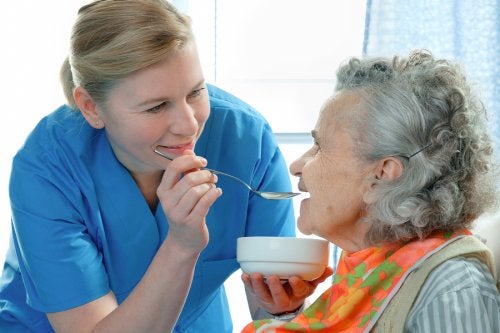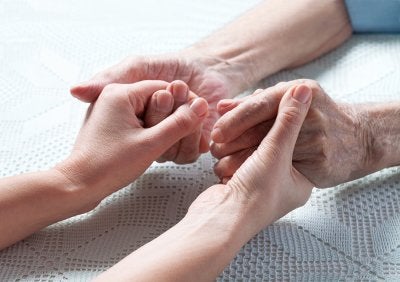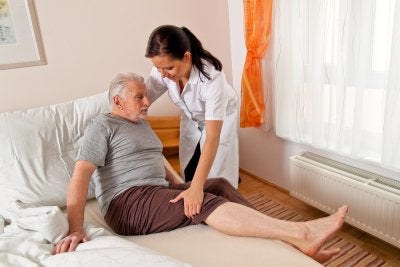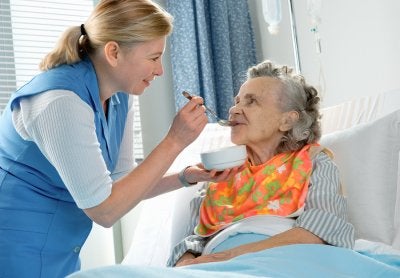-
Get the Facts About Vascular Dementia
There are many different forms of dementia that may require a person to consider elder care assistance. Home health companies near Memphis often work with individuals who have vascular dementia , which is second to Alzheimer’s disease in terms of prevalence. When you watch this video, you will learn that vascular dementia is the result of interference with the blood supply to the brain. When the brain cells are deprived of the life-giving blood they need, they begin to die off. This irreversible damage gives rise to vascular dementia.
A person receiving assisted living care because of vascular dementia may display problems such as confusion, mobility impairment, agitation, or the loss of urinary control. The impairments depend on the area of the brain that sustained damage. There are ways of reducing the risk of vascular dementia, which you’ll learn about from this featured video.
-
What Seniors Need to Know About Heart Disease
Many seniors are living with heart disease, and it’s so important for them and those in charge of elder care in Memphis to be aware of the signs of complications, such as heart attacks. A few minutes can mean the difference between life and death when it comes to heart disease, so what this video to learn the signs you need to know.
Whether you’re a senior or a caregiver, know that most heart attacks don’t involve sudden, severe pain like they do on television. Instead, they start slowly, with chest pain that comes and goes, shortness of breath, and pain elsewhere in the upper body. If you provide elder care for someone with heart disease, these symptoms should be considered red flags that the person in your care needs emergency treatment. In-home care aides can save lives by being present and acting quickly when the person they are caring for has heart attack symptoms.
-
Steps Seniors Can Take to Reduce Bone Fractures
Bone fractures are a significant health risk for seniors. Because many seniors suffer from bone loss, they are more vulnerable to fractures than ever before, and when fractures do occur, they can lead to prolonged loss of mobility, isolation, and depression. Fortunately, there are things that seniors and their caregivers in Memphis can do to reduce the risk of fractures and maintain their independence. Protect your bones or help an elderly love one keep his or her own bones safe with these steps.

Assess the Home
Sometimes, simply making changes around the home can drastically reduce the risk of fractures. Increase lighting in dim areas, such as adding nightlights to hallways or additional lamps in a dark room. Make sure that railings on stairs are secure and consider adding an additional rail so that there is one on each side. Remove trip hazards, like area rugs and cords, and add grab bars around the toilet and in the shower. These small changes can make a big difference in a senior’s risk of falling.
Consider Health
If you are a caregiver for an elderly loved one, consider how his or her health may impact his or her risk of bone fractures. For instance, poor eyesight can make your loved one more prone to falling and fracturing a bone, so ensure that your loved one has regular checkups. Some medications can cause dehydration, dizziness, and other side effects that can increase the risk of a fall that leads to a fracture.
Seek Help
Seniors don’t have to choose between risking a fracture by staying at home or moving into an outside facility. Elderly care providers can help with the things that seniors can no longer safely do, from cooking and cleaning to personal hygiene and running errands. By making sure your loved one doesn’t take unnecessary risks, you can help him or her stay in the comforts of home without the complications of a bone fracture.
-
Requirements of Home Care for the Terminally Ill
When a terminally ill loved one needs care at home, whether he or she needs a caregiver while treatment is ongoing or it is time for hospice care in Memphis , there are unique needs that must be met. It is helpful to choose a caregiver with experience in home care for the terminally ill to ensure your loved one gets the necessary level of care and so you can reduce the pressure on yourself.
First and foremost, a terminally ill loved one may need practical care to assist with basic, everyday needs, such as hygiene and meal preparation. An in-home caregiver can offer this kind of support when you must be at work or when you need respite care. Your terminally ill loved one also needs care that is designed for his or her comfort and dignity. It is common for people to deal with a range of emotions while facing a terminal illness, and your loved one should never feel dismissed or like he or she is a burden to a caregiver. Hiring an experienced caregiver is the best way to make sure that a terminally ill loved one’s needs are being met.

-
Planning for Care at the End of Life
No one likes to think about his or her own death or the death of a loved one, but planning for end-of-life care can make a painful situation easier for everyone. Hospice care in Memphis can play an important part in end-of-life care. Watch this video to learn more.
Try starting a conversation about end-of-life care before someone is facing a terminal illness so that you know your loved one preferences. There are many different options, including terminally ill caregiving at home and hospice home care that provides support for both the patient and the family. Deciding about end-of-life care before it is needed helps families focus on the time they have left together when a terminal illness occurs.
-
Steps to Take When a Loved One Dies at Home
Individuals who are in hospice care are often more comfortable living out the rest of their lives at home. The majority of end of life caretaking in Memphis may be handled by hospice professionals and by an in-home caregiver from a private agency. The primary family caregiver, who is usually the spouse or an adult child, will need to have a checklist of steps to take when the individual passes on.

Locate the DNR
It is likely that your loved one would have a “do not resuscitate” (DNR) order if he or she is in hospice care. You will need to know about this as soon as your loved one enters into hospice care. The DNR is a document that must be issued by a physician. It instructs healthcare providers and/or first responders not to initiate resuscitation efforts in the event that the individual displays cardiac or respiratory arrest. Without a DNR, healthcare providers are required to perform cardiopulmonary resuscitation (CPR). This results in a distressing situation for the surviving family members.
Call Hospice and the Caregiver Agency
After a loved one dies at home , there is usually no need to act immediately. You may wish to sit with your loved one in quiet reflection or you may need to go elsewhere in the home to gather yourself. When you’re ready, call the hospice care team and the private caregiver agency to notify them of the death. They will arrive at your home shortly to assist you and make the official pronouncement.
Contact the Funeral Home
If pre-need arrangements have already been made, you can call the funeral home to notify them. Otherwise, select a local funeral home and make arrangements for the collection of the body. Before the funeral home representatives arrive, the hospice nurse and other caregivers will have already taken certain steps to care for the body and disconnect medical equipment, if necessary.
Make Notifications
If you have close family members nearby, you may wish to notify them before you call the funeral home. They may wish to spend some time with the decedent before he or she is removed. Otherwise, you can make notifications as soon as you feel able to do so. You may not need to make every phone call; notify a core group of close family members and ask that they finish the notifications for you.
-
A Look at the Mission of Caring Companions
For more than 20 years, Caring Companions has provided compassionate in-home care for families in Memphis. As a caregiver agency that is rooted in faith, our associates are particularly dedicated to serving others; in fact, we view it as our ministry. Our assisted living services encompass all non-medical needs that our clients may need, including personal hygiene care, ambulation, transportation assistance, medication reminders, incidental housekeeping, and specialized dementia care.
Our suite of elder care services only tell part of the story of who we are. The professionals of Caring Companions have a keen understanding of the unexpected turns that life can take. We’ll be there for your family during the most difficult of times—from the diagnosis of serious illnesses to end of life care when the time has come. It’s our mission to help individuals live independently, with grace and dignity, but it’s also our mission to guide whole families through transitional times.

-
Identifying Common Post-Operative Challenges
Senior assisted living services are often utilized when a loved one is in declining health, but it’s also a good idea to hire an in-home caregiver in Memphis when a loved one is discharged from the hospital after surgery. This is known as transitional care because the patient is transitioning from hospital care to assisted living care at home. An assisted living provider can help recovering patients with a wide range of post-operative challenges.

Medication Management
After an operation, there may be a number of different medications that a patient might need to take. Typically, post-operative patients take antibiotics and narcotic pain relievers, followed by over-the-counter pain relievers as healing progresses. Some patients might also need to take blood-thinners to reduce the risk of blood clots in addition to their normal medications. It can be a challenge to juggle all of these pills. An in-home caregiver providing transitional care can help patients manage medications by providing medication reminders. This prevents the possibility that a patient might accidentally skip a dose or take an extra dose.
Personal Hygiene
Some surgeries are minimally invasive and may only impose minor limitations on movement. Other operations require a large incision, which can significantly interfere with a patient’s mobility and self-care abilities, particularly if the patient wasn’t in good overall health before the surgery. A transitional care provider may be essential for the patient’s hygiene. Caregivers can assist patients with bathing, dressing, grooming, and toileting, among other routine tasks.
Household Upkeep
For a healthy recovery from surgery, it’s essential to follow the doctor’s post-operative instructions carefully. Usually, these instructions will include limitations on heavy lifting, bending over, and any other strenuous activities. Housekeeping tasks will certainly be out of the question for recovering post-op patients. This is another major benefit of working with a transitional in-home care provider after surgery; all of these tasks can be taken care of by a professional.
Meal Preparation
Balanced nutrition plays a crucial role in the healing process, yet it’s usually difficult for post-operative patients to prepare their own meals. Rather than relying on unhealthy take-out food or premade, frozen meals, patients can enjoy nutritious and delicious homemade meals prepared by an in-home caregiver.
-
The Nutrition-Related Problems of Dementia Patients
Good nutrition is important for seniors, but those with dementia often experience challenges getting the right nutrients. This may be because seniors living with dementia may have a reduced appetite, be too distracted at mealtimes, or have problems feeding themselves. If you’re concerned about your loved one’s health, consider talking to a home health aide near Memphis. Specialized elder care services are available for individuals with dementia, including assistance with meal preparation and feeding.

Poor Appetite
Elder care providers can assist your loved one with a decline in appetite. Among seniors with dementia, poor appetite is often attributable to poorly fitted dentures, changes in medications, and the lack of sufficient exercise. Some people may not want to eat because they no longer recognize the food or because they no longer have a strong sense of taste and smell. It may be helpful to serve five or six smaller meals instead of three main meals. Preparing the individual’s favorite foods and encouraging him or her to move a little more may both help improve his or her appetite.
Mealtime Distractions
Individuals with dementia have trouble with stimulating environments. They may have trouble eating if there are too many distractions present, which can inhibit their ability to get all the nutrients they need . Elder care providers often prefer to keep the television and radio turned off during mealtimes. It can also be helpful to eliminate clutter to encourage a calm environment. For example, it’s best to remove the vase of flowers or bowl of fruit from the table during mealtimes. Only set down the plate of food, a napkin, and needed utensils.
Feeding Problems
It may take an hour or longer for an individual with dementia to consume a meal. Fortunately, dementia care providers have plenty of time to sit with the individual and keep him or her company while eating. It’s generally preferable to allow the individual to retain as much independence as possible while eating, even if self-feeding becomes messy. The caregiver may serve bite-sized finger foods to encourage the individual’s self-feeding abilities. During the mid-to late stages of dementia, it can be helpful to prepare foods in a way that minimizes difficulty chewing and swallowing, such as by grinding up foods or serving soft foods.
-
How to Plan for a Hospital Discharge
If you have a loved one in the hospital, it’s likely that your focus is on his or her immediate well-being. But it is important to take a few minutes to consider his or her post-discharge needs, particularly if your loved one is an older adult who may require assisted living services. First, meet with the hospital care coordinator to discuss which challenges your loved one will face when he or she returns home. Then, contact a caregiver agency in Memphis and schedule an elder care consultation.
When you meet with the representative at the home health agency, bring along a list of your loved one’s anticipated post-discharge challenges. These will likely include mobility limitations and self-care impairments. Develop an elder care plan for your loved one that addresses all of his or her needs. Discharge planning will help your loved one focus on his or her recovery and maintain a high standard of living despite his or her limitations.

